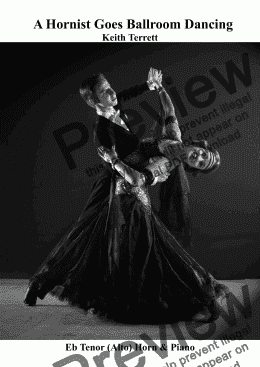Ready to print
You have already purchased this music, but not yet printed it.
This page is just a preview and does not allow printing. To print your purchase, go to the My purchases page in your account and click the relevant print icon.

Already purchased!
You have already purchased this score. To download and print the PDF file of this score, click the 'Print' button above the score. The purchases page in your account also shows your items available to print.
This score is free!
Buy this score and parts
An Eb Tenor (Alto) Horn Goes Ballroom Dancing
$3.97
$1.99
from $0.99
Preview individual parts:
Instant download
You are purchasing high quality sheet music PDF files suitable for printing or viewing on digital devices.A version for the often neglected but beautiful Eb Tenor (Alto) Horn of my ever popular ’’Goes Ballroom Dancing’’ solo.
The version for French Horn and Piano, is published in Germany by Bruno Uetz:www.uetz.de/music
This piece is another in my series of ’’solos’’ aimed at the UK & Australian grade examinations syllabi, and at the US state music contests!
Versions for cello, trombone & euphonium(BC & TC), tuba(including Eb & Bb TC) have been posted!
The Tango originates from Argentina in South America, and is a modern urban dance, performed by couples. It had adopted its characteristic features by the first decade of the 20th century in Buenos Aires. Before then it was a hybrid form, combining elements of the Andalusian tango, habanera, and mislonga. It is normally based on syncopated patterns within a 2-4 or 4-4 meter.
The beguine is a dance and music form, similar to a slow rumba. It was popular in the 1930s, coming from the islands of Guadeloupe and Martinique, where in local Creole Beke or Begue means a White person, and Beguine is the female form. It is a combination of Latin folk dance and French ballroom dance, and is a spirited but slow, close dance with a roll of the hips.[citation needed.
After Cole Porter wrote the song "Begin the Beguine", the dance became more widely known beyond the Caribbean. The song was introduced in Porter's Jubilee (1935). Artie Shaw's extended swing orchestral version was a hit in 1938. After its appearance in the musical Broadway Melody of 1940, it became a big band staple and eventually a pop standard by the likes of Frank Sinatra and Ella Fitzgerald.
Elvis Presley co-wrote and recorded his 1962 version of the Cole Porter song, and entitled it "You'll Be Gone".



